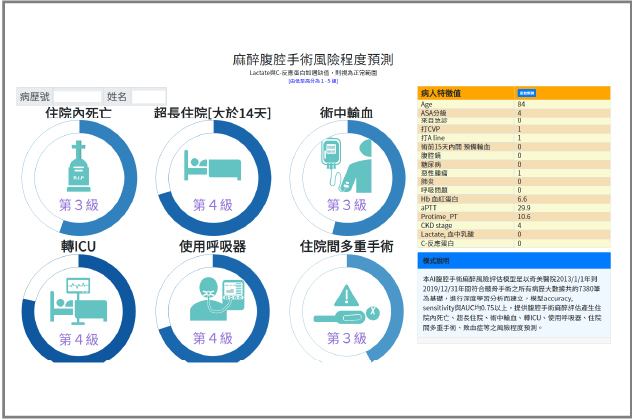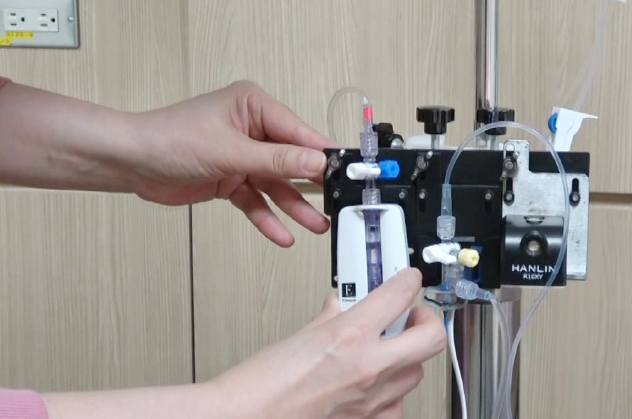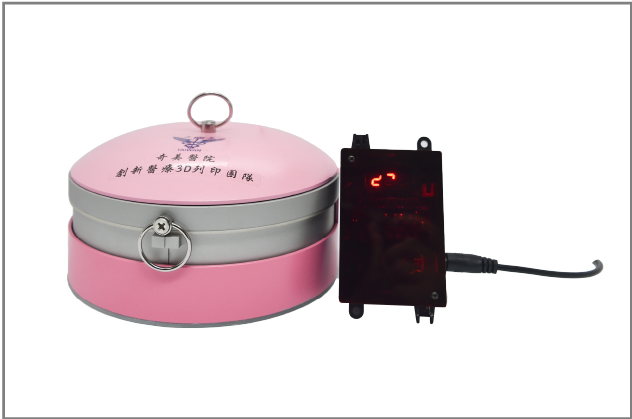
The process of chemotherapy compounding leaves no room for error. It relies on specially trained pharmacists working in specially designed negative pressure rooms. However, due to the toxicity of chemotherapy drugs, any miscalculation in dosage or error in handling leftover drugs poses a risk to both patients and the pharmacists involved. Focusing on precision oncology, Chi Mei Medical Center (Chi Mei, also known as Chi Mei Hospital) will showcase a range of tools for cancer-related examinations and chemotherapy drug preparation during the Healthcare+ Expo.
Chemotherapy Compounding with Robotic Arms: Risk Minimised, Safety and Accuracy Assured

Chi Mei Medical Center and Innolux Corp. co-developed this robotic arm system to prepare compounded medications (Photo by Chi Mei)
Chi Mei, leveraging Taiwan's leading technology and manufacturing advantages, has collaborated with Innolux Corporation to develop the first made-in-Taiwan, intelligent chemotherapy drug preparation robotic arm in Asia. Pharmacists can now proceed with hazardous drugs in a sterile environment without any safety concerns. During compounding, a dual verification system uses barcodes and photos on drug bottles to ensure dosage extraction by inputting physiological value such as the patient’s weight.
This robotic arm system is seamlessly integrated with the prescription system, cross-verifying the accuracy of the drugs and dilution solutions before compounding. This not only protects patients from microbial contamination but also safeguards pharmacists, preventing exposure to hazardous drugs and ensuring their health and safety.
This system is already in operation at Chi Mei and is scheduled to make its debut at the 2023 Healthcare+ Expo. Its applications extend beyond domestic medical institutions, as it can be exported to countries in the SEA region that are setting up cancer centers.
Metabolic Profiling Reducing Chemotherapy Side Effects
In addition to introducing the robotic arm system, Chi Mei Precision Medicine Center has also adopted a next-generation gene sequencing instrument for high-sensitivity liquid biopsy testing. With just two tubes of blood, patients can receive a comprehensive report on 523 tumour genes within 10 working days. This, in turn, informs crucial decisions on medication, thereby increasing opportunities for effective clinical treatment.
Even for rare cancers like soft tissue tumours, this approach aids in accurate diagnosis, classification, and prognosis, and provides options for targeted therapy. Chi Mei’s team has further released findings from precise metabolic profiling, uncovering associations between vitamins, fatty acids, trace elements, and the effectiveness of cancer treatment. This valuable information assists cancer patients in minimising the side effects of chemotherapy and radiation therapy.
★★★More by Chi Mei Medical Center
◎Intelligent Operating Room (IOR)
In collaboration with iMedtac Co., Ltd., Chi Mei has implemented a platform to manage operating room schedules. This platform confirms patient information, the type of surgery, necessary equipment preparation, and surgery duration, and even allows for flexible adjustment of healthcare logistics, such as staffing needs. In the past, issues like overtime for surgical staff, delayed use of operating rooms, and emergency surgeries relied on paper-based rescheduling. With this platform, healthcare personnel can easily access information about their assigned operating room for the day, assess whether staffing is enough by midday, reduce on-call shifts, and lower the turnover rate of operating room nurses.
◎Personalised Anesthesia Risk Prediction Dashboard
Assessing the risk of adverse complications during surgery anesthesia is a crucial preoperative step. Accurately measuring this risk beforehand can reduce the probability of postoperative complications, identify high-risk groups, and subsequently adjust the surgery anesthesia plan. However, predicting the probability of postoperative complications in surgery anesthesia requires consideration of a large amount of clinical information.
Chi Mei utilises a personalized anesthesia risk prediction dashboard with an overall accuracy rate of approximately 0.8 or higher. Currently, they have developed assessments for three types of surgeries, including hip, abdominal, and thoracic surgeries. By inputting parameters such as age, weight, diseases, and tumours, the system uses big data averages to provide patients with six risk readings for reference. These include factors like the likelihood of requiring intraoperative blood transfusion, extended hospital stay, and surgical mortality.
In addition to visualised presentation, this approach facilitates communication between doctors and patients. It encourages patients to actively control relevant risk factors, thereby reducing the overall surgical risk.

Chi Mei’s visualised presentation for anesthesia risk assessment (Photo by Chi Mei)
◎Detection Instrument for Catheter Zero Point Calibration
Intensive care units often employ various monitoring devices connected to catheters as medical aids in diagnosis and treatment. The accuracy of catheter calibration can impact the measurement values and medical decisions. This innovative instrument uses a laser light source for precise horizontal calibration, and the electrically powered track facilitates vertical movement of the fixed base during calibration.

This innovative instrument uses the electrically powered track facilitates vertical movement of the fixed base during calibration (Photo by Chi Mei)
When used by healthcare professionals, this instrument achieves convenience, precision in measurement, and reduces the manual strain on nurses during operation. It eliminates visual errors amongst operators and effectively enhances the accuracy of measurement values. This is advantageous for nationwide clinical promotion and adoption.
◎Pressure Relief Devices for Medical Device-related Pressure Injuries
In clinical settings, aside from common pressure injuries on the body, there are medical device-related pressure injuries (MDRPI), including those caused by various drainage tubes, medical injection valves, oxygen therapy masks, and more. Chi Mei has invented corresponding pressure relief devices. These devices combine low-rebound foam, skin-friendly breathable membranes, and other related materials to design various pressure relief devices. They fit for purposes such as pressure relief, fixation, reduction of shear force, waterproofing, and breathability. Simultaneously, they prioritise comfort, aesthetics, durability, and ease of operation. After successful clinical trials, these devices are now officially in mass production and available for sale.
◎Intelligent, Portable and Refrigerated-inside Medicine Storage
The upgraded smart medicine cabinet, developed in collaboration with China Chemical & Pharmaceutical Co., Ltd, not only performs functions like accurate medication retrieval, quantity check, and drug inventory control but also features a refrigerated section. This allows for the transportation of medications or injections that require low-temperature storage.
◎Intelligent Moxibustion Box
Moxibustion is a commonly used therapy in Chinese medicine, but traditional moxibustion practices are prone to causing burns or even fires. The Intelligent Moxibustion Box introduces six major innovations, including temperature monitoring, a magnetic adsorption lid, and a heat dissipation window, ensuring the safety of the moxibustion process.

Intelligent Moxibustion Box improves safety while in use (Photo by Chi Mei)
◎Virtual Consultation Room
The Virtual Consultation Room involves the synchronous use of virtual reality devices by both doctors and patients. It integrates the hospital's imaging and medical exam report databases, allowing healthcare providers and patients to digitally discuss medical conditions in the same virtual space and at the same time.
B2B Opportunities with Chi Mei Medical Center
AI in Healthcare
| Products/Solutions | Partnership wanted |
|---|---|
| Personalised anesthesia risk prediction dashboard: For hip, abdominal, thoracic preoperative prediction, surpassing ASA 5 classification | Technology transfer; product validation |
Digital Health
| Products/Solutions | Partnership wanted |
|---|---|
| Intelligent operating room | System construction and implementation |
| First homegrown robotic arm system for chemotherapy compounding | Piloted by Chi Mei, looking to promote use by other facilities and product sale |
| Virtual consultation room | System construction; technology development |
Precision Medicine
| Products/Solutions | Partnership wanted |
|---|---|
| Genetic testing and analysis for cancer | Contracted services for cancer gene tests and micronutrient tests |
Innovative R&D
| Products/Solutions | Partnership wanted |
|---|---|
| Intelligent, portable and refrigerated-inside medicine storage | Assisting in promoting domestic and international sales |
| Detection instrument for catheter zero-point calibration | Production, manufacturing, and sales channels |
| Pressure relief devices for medical device-related pressure injuries | Product sales and distribution channels |
| Intelligent moxibustion box | Promotion for use in major traditional Chinese medicine hospitals and for personal home healthcare |
Chi Mei Medical Center at Healthcare+ Expo 2023
- Thursday, 30 November to Sunday, 3 December
- Booth No. M503a | 4F, TaiNEX 1
